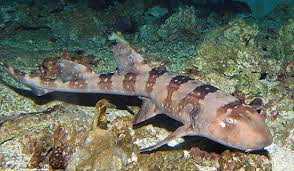The white-spotted bamboo cat shark is a carpet shark. This species is nocturnal and primarily harmless to humans. White-spotted bamboo sharks have a very distinct dorsal fin that can alter or effect where they choose to live, as well as their mobility methods. They are found in the Pacific Ocean. Since these sharks are nocturnal, they feed at night, mostly praying on small fish and invertebrates. Juvenile sharks need a higher intake of carbon than adult sharks, especially during the wet seasons. White spotted bamboo sharks have an advantage in finding carbon sources because they are benthic predators (meaning they prey on fish near the sea-bottom). These species of sharks have electroreceptors along their snout to help them locate prey that is buried in the sand and mud, makes them very efficient users of detrital carbon resources. Whitespotted bamboo sharks are oviparous (egg laying). A theory adapted from an aquarium in Indonesia sugested that the female contains both the male and the female reproductive organs; the female has the ability to store sperm for that long; and lastly that the female has somehow stimulated the eggs without sperm, process called parthenogenesis. The offspring kept away from males produced asexually viable offspring.
